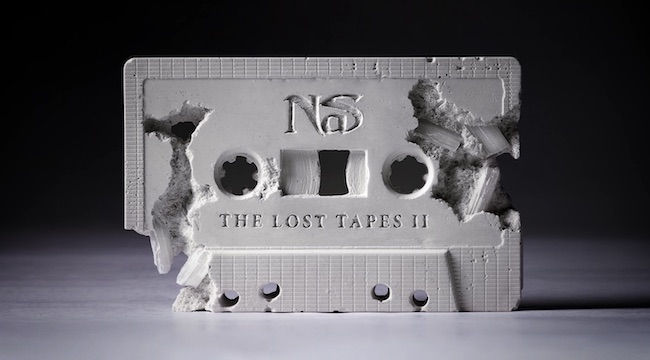
When it comes to reputation, there are many schools of thought, but I like to think that like most things, those schools can be boiled down to a straightforward binary.
Some people believe that once you have a reputation, it’s locked in for life, and therefore basically immutable. If you have a reputation as, say, one of the top five rappers of your time, subscribers to this view will never accept that you are anything but, and will have a hard time updating their lists to account for recent output or changing times.
Others believe that a reputation is only as good as its most recent proof. These folks wonder “what have you done lately,” and won’t hesitate to rewrite an artist’s perception in real time if they don’t believe that the artist’s latest work lives up their legacy.
If you’re one of the former, Nas’ latest album, the outtake collection called The Lost Tapes 2 is likely satisfactory to maintain Nas’ reputation as one of the all-time greats. If you’re the latter, you’ll likely see it as the latest link in a growing chain of evidence that Nas may have been great, his “all-time” status should be questioned.
For many fans, Nas’ reputation has been certified ever since Illmatic, which is all the backing they need to support their continued approval of the veteran rapper through his career ups and downs. Even his least-liked albums, I Am and Nastradamus, have undergone something of a reevaluation in the eyes of his staunchest supporters in recent years, causing some to refute Jay-Z’s “one hot album every ten-year average” claim against his onetime foe.
Meanwhile, for others, the beat selections and often wacky musings of the Queensbridge spitter on those albums — and on others, like Hip-Hop Is Dead and Street’s Disciple — have been used to fuel a narrative that casts Nas as a washed-up former superstar who is unable to come to terms with the modern trappings of hip-hop or the unpopularity of his odder beliefs.
The one place both sides seemed to find common ground was on the previous The Lost Tapes, which found Nas once again balancing the urgency of his personal narratives and the vivid details of his more fanciful, gangster movie-inspired tableaus. The disjointed and awkward beats which often brought him so much ridicule were nowhere in evidence as he opted for more traditional, soulful tapestries that better highlighted his verbal gifts. The Lost Tapes seemed to beg the question: If these are just his throwaways, why does he keep giving us dinky sounds and half-baked radio overtures?
It makes sense that he’d want to return to that unifying project during the time his reputation is at its most polarized, but it seems he’s destined to forever operating a hair out of step with the times. Where the original Lost Tapes brought fans and critics together, this one seems as though it will only further polarize listeners’ views of the titanic figure, who lives up to both sides of his rep here. He is by turns the sage, inimitable lyricist and the wonky conspiracy theorist, the rapper who can rap on any beat but should probably stop trying to prove it.
Plenty of side-eyes will be directed at the frantic rapping and jarring, experimental jazz beat on “Jarreau Of Rap (Skatt Attack),” where Nas attempts to rhyme along to a “Flight Of The Bumblebee”-esque piano pattern rather than the scattershot drums — it’s an impressive trick, but it’s also practically unlistenable for all its novelty. Even worse at times are the hooks — whether provided by RaVaughn or Swizz Beatz, they are not enjoyable or catchy enough to support their respective songs.
Yet, when Nas is on point, as he is on “Lost Freestyle,” “The Art Of It,” and especially the sweet, reflective “Queensbridge Politics,” he reminds why his reputation is as solid as it is. These are Nas at his best, unrestricted by commercial considerations and completely in his element. It’s when he tries to do anything other than straightforward, street-centric narratives that he falters. Given how much of this material dates back to his prior, critically middling projects, it happens more than fans might hope.
Nas has never sounded as old as he does on the tracks from his Hip-Hop Is Dead sessions — considering that he sounded like a gruff, out-of-touch old head on much of that project, he dates himself even more here. Meanwhile, the Life Is Good-era recordings (“You Mean The World To Me,” “Royalty”), bitter as they are, read even worse in the wake of Kelis’ accusations against him — like the gaslighting efforts of a guilty man. At best, Nas sounds nostalgic for better days (at least for himself). At his worst, he sounds regressive and a little loopy — “Tanasia” is an especially low point.
While The Lost Tapes 2 doesn’t do enough to justify its existence, Nas’ reputation is enough to bring in listeners, if only to confirm to themselves what they already thought going in. There’s more than enough material to prove that he’s long past his expiry date, and plenty still to confirm that he’s one of the best to ever pick up a mic. Nas himself says he has enough unreleased material recorded to fill both a Lost Tapes 3 and a Lost Tapes 4. He may never have to record a new album again.
The Lost Tapes 2 is out now via Mass Appeal Records and Def Jam Recordings. Get it here.






